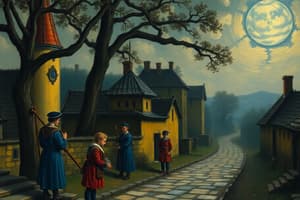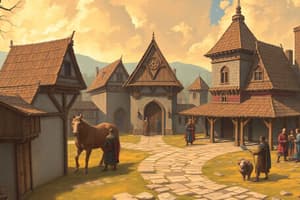Podcast
Questions and Answers
What was the primary basis of feudalism?
What was the primary basis of feudalism?
- Mutual respect among all individuals
- Equality in land ownership
- The idea that everyone owed service to someone else (correct)
- A democratic system of governance
How did lords maintain order within their kingdoms under feudalism?
How did lords maintain order within their kingdoms under feudalism?
- By enforcing strict laws without exceptions
- By granting land to peasants in exchange for services and loyalty (correct)
- By providing free land to all peasants
- By appointing peasants as rulers
What role did vassals play in feudal society?
What role did vassals play in feudal society?
- They owed loyalty to the king only
- They had no obligations to anyone
- They pledged loyalty to the lord who held power over them (correct)
- They were independent rulers with their own territories
What were the key societal changes during the Medieval History period?
What were the key societal changes during the Medieval History period?
What aspects collided to create an intricate tapestry in Medieval History?
What aspects collided to create an intricate tapestry in Medieval History?
What marked the beginning of Medieval History in Europe?
What marked the beginning of Medieval History in Europe?
Which civilization managed to preserve its culture during the Medieval period despite facing attacks?
Which civilization managed to preserve its culture during the Medieval period despite facing attacks?
What was a key driver for the political consolidations during the Middle Ages?
What was a key driver for the political consolidations during the Middle Ages?
What contributed significantly to the wealth of cities during the Medieval period?
What contributed significantly to the wealth of cities during the Medieval period?
Which monarchy played a significant role in the formation of new states with distinct cultures during the Medieval period?
Which monarchy played a significant role in the formation of new states with distinct cultures during the Medieval period?
What was a notable development in trade during the Medieval period?
What was a notable development in trade during the Medieval period?
Flashcards are hidden until you start studying
Study Notes
Medieval History refers to the period of European history from approximately the late fifth century A.D., following the decline of the Western Roman Empire, until around the mid 15th Century, when many parts of Europe started entering into the Early Modern Period. This era was marked by profound changes in social structures, religious movements, warfare techniques, and economic systems across various civilizations.
One significant development during this time frame is the spread of Christianity throughout much of the continent. Byzantium, which would later become Eastern Rome, managed to preserve their culture even while under attack by other groups such as the Slavs. Centralizing powers emerged through monarchies like the Carolingian Dynasty of France, which led to the formation of new states with distinct cultures. These changes were often driven by religion; for instance, the political consolidations of the Middle Ages developed out of the Christianization process.
Another key feature of Medieval history was the resurgence of trade. Before the fall of Rome, there had been little commercial activity outside the cities. But by the end of the period, merchant ships could travel great distances along coastal routes, just as they do today. This meant that goods moved more easily between towns, leading to increased specialization among artisans. Cities became wealthier as a result, especially those near major waterways like rivers or coastlines.
The rise of feudal society also occurred during this time. Feudalism was based upon the idea that everyone owed service to someone else. For example, lords gave land to peasants who worked it, paid taxes, and fought battles in return. Kings used this system to maintain order within their kingdoms. In some countries, however, vassals pledged loyalty only to the man who held power over them - sometimes causing conflicts.
In summary, Medieval History encompasses a broad range of events spanning centuries. It saw societal change brought about largely due to cultural shifts such as religiosity and centralized statehood combined with technological advancements enabling improved transportation infrastructure. It is a fascinating chapter in human civilization where different aspects collide creating an intricate tapestry reflective of our past.
Studying That Suits You
Use AI to generate personalized quizzes and flashcards to suit your learning preferences.




